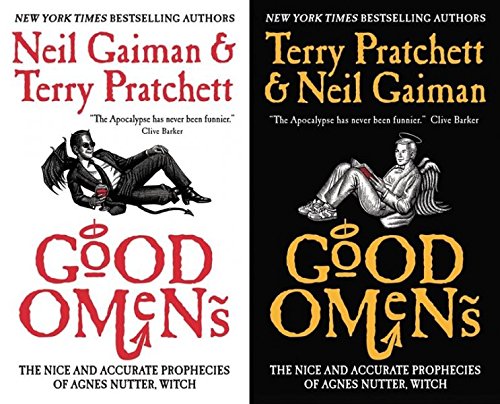
Title: Good Omens: The Nice and Accurate Prophecies of Agnes Nutter, Witch
Authors: Neil Gaiman, Terry Pratchett
Publisher: William Morrow (first published in 1990)
My Rating: ★★★★★
Goodreads | Amazon | Wordery | Waterstones
☆゚.*・。゚Please consider supporting your local indie bookshop – ask if they have this in stock! ☆゚.*・。゚
Synopsis
People have been predicting the end of the world almost from its very beginning, so it’s only natural to be sceptical when a new date is set for Judgement Day. But what if, for once, the predictions are right, and the apocalypse really is due to arrive next Saturday, just after tea?
You could spend the time left drowning your sorrows, giving away all your possessions in preparation for the rapture, or laughing it off as (hopefully) just another hoax. Or you could just try to do something about it.
It’s a predicament that Aziraphale, a somewhat fussy angel, and Crowley, a fast-living demon now finds themselves in. They’ve been living amongst Earth’s mortals since The Beginning and, truth be told, have grown rather fond of the lifestyle and, in all honesty, are not actually looking forward to the coming Apocalypse.
And then there’s the small matter that someone appears to have misplaced the Antichrist…
(Taken from Goodreads)
What I Liked
I picked up this book because my friends wouldn’t stop talking about how great it is, just as the tv series came out. “Sure, I’ll give it a shot,” and I’m so glad I did! I never thought that Armageddon would happen in England, or that by end of it I would be wishing for an ancestor as awesome as Agnes and a classy Bentley that only plays Queen.
“Most books on witchcraft will tell you that witches work naked. This is because most books on witchcraft are written by men.”
– Good Omens
I’m not sure if I can define this book as urban fantasy or magical realism, simply because the line between supernatural and everyday reality is beautifully blurred. Whenever angels or demons are introduced into an every-day setting, one of my main worries (and pet-peeves) is that they are too overpowered in comparison to everyone and everything else. In Good Omens, this wasn’t the case. Although Crowley could defy the laws of physics with a wiggle of his hand and Aziraphale could speak with God and possess another’s body, they are still relatable characters with relatable life experiences. Talking to God – or rather, God’s voice – is for Aziraphale as complicated and unfruitful as calling customer services to cancel your subscription; replacing bodies is a truly hellish spiral of bureaucracy for Crowley. They have virtues and vices – not too unlike the humans whose lives they are constantly influencing. I love that they’re so attached to Earth and the ever-changing, ever-fumbling humans on it.
“It has been said that civilisation is twenty-four hours and two meals away from barbarism.”
– Good Omens
Adam was a definite favourite. It is only the innocence and practicality of a child, despite being The Antichrist, that can save the world from entities who have never lived in it. At times an angels, at others a devil, his boundless, unformed potential carries the story onwards to a spectacular ending that had heaven and hell in utter stupor. I was very happy with the ending. It is appropriate. It is unapologetically human.
“You don’t have to test everything to destruction just to see if you made it right.”
– Good Omens
From the beginning, right until the ending, this book is a wild joyride full of irreverent, deadpan comedy interspersed with nuggets of truly human wisdom. It is not a book about angels and demons, or good and bad, or their endless war. Ultimately, this is a book about humans. And for all our awkwardness, obliviousness, and incapacity to communicate… boy do I love us.
“… Imagine a figure, half angel, half devil, all human.”
– Good Omens
What I Liked a Little Less
Probably this is my editor/proofreader mind overtaking, but I noticed a few printing errors here and there in my edition (like missing closing speech marks). Not many – not at all! – but it did switch my attitude to the text from “reading” to “proofreading.” And I know that “should of” is used to portray a more realistic speech, but I did have the urge to write “should have.”
The story follows a whole cast of characters through the week before Armageddon. As such, it is by necessity a narrative mosaic composed of snippets that highlight a different point of view every time. I personally don’t mind non-linearity (I think it’s actually one of the best things in the novel!), but I can see that not being everyone’s cup of tea. What I did find a little disorienting at times, however, was the rapid-firing of secondary characters. These were often side-characters that would not make another appearance past the current scene. After a few pages they became so many that it proved hard for me to keep track of them and keep them in mind.
Recommendations
Do I Recommend This Book? Absolutely yes! It’s a real gem.
Books Like This: Although this book is really one of a kind, if you enjoyed it you would definitely love other books by Neil Gaiman (like Neverwhere) or Terry Pratchett (The Colour of Magic is the first instalment of the Discworld series).
(Links redirect to Goodreads)


